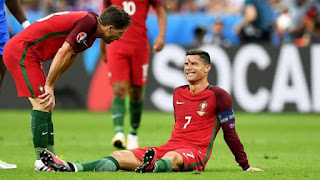World Cup Final 2019 Preview
Courtesy of two very different semi-finals this year’s World Cup final
will see England, bidding for a second title, take on South Africa who will be
competing for their third triumph. The last time these two sides met in a World
Cup was back in 2007 where they played out this same fixture with the
Springboks winning 15-6, a game not without its controversy. Since that day
they’ve met twelve more times with South Africa winning eight of them, but
perhaps crucially and most encouragingly, England have won the last two.
England are the
favourites; their performances so far have turned heads whilst South Africa
have quietly gone about their business doing what they needed but no more.
England’s victories have been born out of solid defence and exciting attack
they’ve gathered speed getting better and better as the tournament progresses.
Their victory over New Zealand perhaps unfairly described by many as a
‘surprise’ was brilliant, the score line flattering their opponents if anyone.
A thrashing over Australia and a convincing victory in the pool against
Argentina means the Boks are the last of the southern powerhouses to beat to
complete a clean sweep. South Africa are however the Rugby Championship
champions and their direct no-nonsense approach threatens a test of physicality
far beyond anything England have come up against so far. It’s no surprise the
Springboks are here, a pre-tournament dark horse for many they have adopted a
clear game plan that crucially wins test matches. If South Africa pull their
opposition into the old-fashioned arm wrestles that they love they can be a
very tough side to beat, just ask Wales.
So how can we
expect the 2019 World Cup final to play out, who are the key players and where
are the crucial battle grounds in this mouth-watering fixture.
The back row and
controlling tempo
Curry, Underhill
and Vunipola versus Kolisi, Du Toit and Vermeulen (provided they line up the
same as in the semi-finals) promises to be an enormous contest in every sense
of the word. The battle at the breakdown and on the floor will prove critical
to the outcome of the game, not only will penalties be won but the victor here can have a big influence in managing the speed of the match. It’s a
massive part to South Africa’s game and is one of the big areas where England
have improved compared to four years ago. Against New Zealand, Curry and
Underhill were rampant with big hits and game defining turnovers, not only did
this assert dominance but it also allowed England to play with tempo and
front-foot ball from which they are hugely destructive. South Africa prefer
things much slower, taking the pace off the ball and creating a disjointed stop
start environment will play into their hands. If they can dominant in the
tackle (of which these six will make a mammoth number) slow the ball down and
protect their gain line they can frustrate and contain England who so far have
not been made to adapt their game plan mid contest.
Territory and
kicking are key
Kicking for
territory is likely to be the easiest way for sides to get the upper hand and
the ensuing battle from the base between Ben Youngs and Faf de Klerk is not
likely to be the most exciting individual contest but could prove to be one of
the most important. Box kicking will play its part but the clearing kicks from
the likes of Pollard and Farrell will also be massive. England will want to
keep the ball on the pitch as much as possible, kicking it off must relieve
pressure or result in a substantial territorial gain, in the past they’ve been
guilty of kicking for the sake of it. South Africa, however, knowing the
strength of their driving maul and preferring a slower pace will relish the
opportunity to keep England pinned in with the ball out of play for large
periods. The Springboks, led by Pollard who is an exceptional kicker with
ball-in-hand did a superb job of keeping Wales out of the red zone. The
importance of this proven by the fact the one-time Wales did venture in they
fashioned their only seven-point score, any more visits and the result could
have been different. England are capable of attacking from much deeper than the
Welsh though and so the importance of keeping the majority of the fixture’s
play away from their line becomes even more essential. The English too will
know they cannot allow South Africa to play large periods camped on their line,
from close range the Springboks size and physicality makes them almost
impossible to stop, whilst Handre Pollard’s boot means playing anywhere in your
half risks three points being conceded.
‘The finishers’
The longer a team
goes in a tournament the more their strength in depth is tested. The physical
exertions on both sets of players will be beginning to stack up and those
starting will once again empty the tank for their respective countries. Do not
however underestimate the value of those on the bench. Finishing the match with
cool, experienced heads will be the want of both coaches and having a sense of
control and calm when the game reaches its climax is critical. Bringing players
on from the side lines is obviously very important in terms of replacing those
that are physically worn out but it is also a coach’s last throw of the dice in
terms of changing a game. Wales bought Patchell on against South Africa to try
and alter the match’s course, to try and inject a different style of play and
make something happen. Both sides competing in the final have players that are
capable of shifting momentum single-handedly or altering the makeup and threat
of a team entirely. It was Francois Louw from the bench who won the crucial
defensive penalty in the semi-final from which the Springboks then won another
to ultimately win the game. Whilst Henry Slade who was on England’s bench
against New Zealand can come on and shift the entire midfield dynamic, posing
completely new questions to defenders who two minutes earlier had everything
figured out. The effective utilisation of every man in the twenty-three strong
line-ups will be critical and finding the right balance of forwards and backs
on the bench could be pivotal.
Daly v Le Roux –
the battle at full-back
Its highly likely
that the two starting full-backs will be Elliot Daly and Willie Le Roux, two
men who know each other well from their time at the Ricoh in Coventry. So far
this tournament Daly has been brilliant under the high-ball, an area he has
struggled massively with over the last few years. For large periods leading up
to the World Cup there were calls for Eddie Jones to drop Daly and put in
someone more reliable, he stuck with his man though and his faith, so far, has
been rewarded. However, if last weekend’s game was anything to go by he is
going to need to be at his very best against South Africa. Almost every
Springbok possession was hoisted high and a safe pair of hands under it will be
essential for England. Le Roux on the other hand hasn’t been quite as steady
and England will have spotted this, his nerve too will be tested by the likes
of Ford, Farrell and Youngs in a game where possession will be key and spills
costly. These two will also be massively important going forwards, in big
physical games with tired bodies all around the abilities of the lightning fast
Daly and the magical playmaking skills of Le Roux could be massive.
Discipline
It’s one of the
most obvious factors in deciding rugby games but the discipline of both sides
will be tested enormously, penalties could well decide who lifts the Webb
Ellis. Red and yellow cards for high hits have dominated this year’s tournament
and with the game likely to feature plenty of big tackles its essential both
teams ensure they get every contact spot on. Referees have already proven they
aren’t messing about in this area so even the most innocuous of possessions
could turn the game on its head in seconds if a player gets things just a
little wrong. England have a few players in their ranks that have fallen foul
to moments of madness in the past, controlling their emotions on the biggest
stage is essential, even with a pack of goading Springboks in your face. It’s
naïve to think neither team will be up at the other come every scrum, set-piece
and break in play. We saw from Sam Whitelock’s petulant slap in the England New
Zealand game what can happen to seasoned professionals when frustrated long
enough.
PREDICTION
England 24-13 South
Africa


Comments
Post a Comment